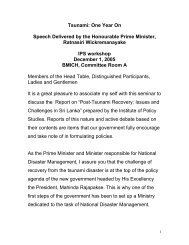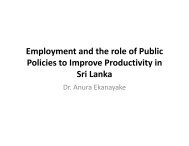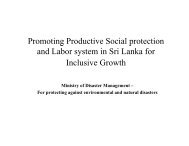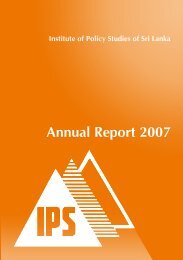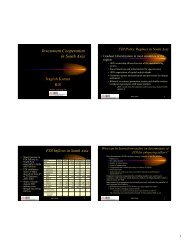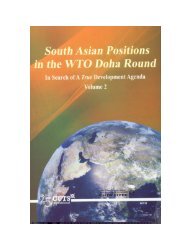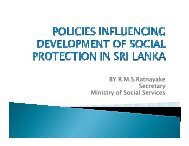Annual Report 2005 - Institute of Policy Studies of Sri Lanka
Annual Report 2005 - Institute of Policy Studies of Sri Lanka
Annual Report 2005 - Institute of Policy Studies of Sri Lanka
- No tags were found...
Create successful ePaper yourself
Turn your PDF publications into a flip-book with our unique Google optimized e-Paper software.
IPS ResearchResearch ProgrammeThe substantive focus <strong>of</strong> the <strong>Institute</strong>’s research programme is to provide an integrated analysis <strong>of</strong> themedium to longer term development challenges facing <strong>Sri</strong> <strong>Lanka</strong> in order to meet the fundamentalpolicy objectives <strong>of</strong> sustainable growth, equity and poverty alleviation. The central policy issues are taken upunder research themes and carried out under research programmes in thematically selected areas <strong>of</strong> research.These research programmes reflect recognized strengths <strong>of</strong> the <strong>Institute</strong>, existing staff expertise, accumulateddatabases and perceived areas <strong>of</strong> policy need. Each programme works within the medium-term researchagenda, adopting cross-linkages across the programmes wherever feasible to ensure coherence and policyrelevance to the overall direction <strong>of</strong> the <strong>Institute</strong>’s research output.The main research programmes at present are as follows: Macroeconomic <strong>Policy</strong>, International Economic<strong>Policy</strong>, Labour, Employment, Human Resources Development and Industrial <strong>Policy</strong>, Public Enterprise Reform,Competition, and Regulatory <strong>Policy</strong>, Environmental Economic <strong>Policy</strong>, Health <strong>Policy</strong>, Poverty and SocialWelfare, and Agricultural Economic <strong>Policy</strong>.In addition to these main research programmes, other specialized areas <strong>of</strong> research such as governance,gender, political economy etc., are also undertaken by the IPS to enable the IPS to incorporate a broader range<strong>of</strong> issues in its overall work programme. The research programme seeks to address key issues in theseresearch areas through IPS funded work as well as externally funded collaborative work with both domesticand international partners.BackgroundA central theme that has emerged in policy discussion, is how to achieve more equitable growth – be it on thebasis <strong>of</strong> regional, income, or ethnic disparities – without compromising the overall growth potential <strong>of</strong> theeconomy. While the broad thrust <strong>of</strong> economic policy remains within the framework <strong>of</strong> a liberal open economy,the perceived disparities in economic growth has brought about a nuanced change in focus. Increasingly,greater emphasis has come to be placed on rural economic development, agriculture, and small and mediumenterprises (SMEs) as means <strong>of</strong> generating growth with equity. The challenge will be to devise policies thatregenerate the rural economy without imposing a cost on the more competitive industrial and services sectors.The core aim <strong>of</strong> IPS research is to contribute constructively to the discussions and debates on appropriatepolicies to achieve sustained and equitable growth by providing an analysis <strong>of</strong> some <strong>of</strong> the priority issues.The IPS research output over time has addressed many <strong>of</strong> these key areas; the intention is to build on thesubstantive work that has already been carried out, identify gaps in the existing body <strong>of</strong> research andformulate a coherent medium-term work programme. As such, under the overall theme <strong>of</strong> achieving sustainablegrowth with equity, key questions around which the research agenda is programmed include the following:• Where will growth come from in the medium-term?• Why and how is poverty and inequality increasing?• What is the role <strong>of</strong> the State in generating equitable growth?• How can <strong>Sri</strong> <strong>Lanka</strong>’s macroeconomic policies be shaped to achieve equitable growth?• How can livelihoods be protected and vulnerability <strong>of</strong> the poor reduced?9__________ <strong>Annual</strong> <strong>Report</strong> <strong>2005</strong>



